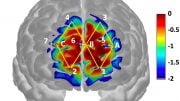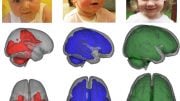
Recent research has revealed that preterm infants do not habituate, or get used to, repeated pain in the same way as full-term infants, children, and adults. This lack of pain habituation could potentially impact their development, as the ability to become accustomed to moderate, non-life-threatening pain is believed to develop during the third trimester of pregnancy, and preterm babies might not have developed this ability at birth.
According to a study led by researchers from University College London (UCL), preterm infants do not habituate to repeated pain in the same way as full-term infants, children, and adults.
The authors of the new study published in the journal Current Biology suggest that if preterm infants have not yet developed the ability to habituate to moderate pain, medical procedures performed in their early weeks of life could potentially affect their development.
Lead author Dr. Lorenzo Fabrizi (UCL Neuroscience, Physiology & Pharmacology) said: “The way that we can get used to things can be seen as the simplest example of behavioral and brain plasticity, and it is a basic part of memory and learning. Pain habituation is important because it enables us to preserve physical, emotional, and cognitive resources by not overreacting to pain that is unavoidable or not life-threatening.
“Our findings suggest that the ability to get used to repeated pain might develop during the third trimester of pregnancy so that babies born prematurely have not yet developed this ability that full-term babies have right from birth.”
The study involved 20 infants at University College London Hospitals (UCLH). Half of them were preterm (and tested while still younger than 35 weeks gestational age), while the other half were either born at full term (seven infants) or preterm but tested at term age (three infants). The two groups were comparable in terms of their actual postnatal age, as the preterm babies had a median age of 14 days, compared to 10 days among the full-term (or term age) group.
The researchers were measuring the infants’ responses to a painful but clinically required heel lance (blood test), which was conducted twice (three to 18 minutes apart) for each infant (two lances are sometimes required to collect enough blood; this is not needed for most infants so only those that needed a second lance were included in the study).
Heel lances can elicit substantial pain responses in infants, but it was not previously known whether this decreases on repeated lances. To understand this, the researchers recorded the infants’ brain activity with EEG (electroencephalography) electrodes placed on the scalp, and their heart rates using ECG (electrocardiography), while also monitoring their facial expressions and reflexes in withdrawing the leg.
The researchers found that the brain activity was not as strong immediately after the second heel lance, compared to the first, suggesting a habituation response, but this was only the case for full-term infants. They found a similar pattern for heart rate and facial expressions, as preterm infants reacted just as strongly to both heel lances, while the full-term infants appeared to habituate to the pain.
The team says this habituation response might be due to the full-term infants anticipating the imminent pain when they receive a second heel lance, so their reaction is less pronounced, or it may instead or additionally be due to their brains modulating their reflexive survival responses.
They add that habituation to pain might protect full-term infants, but not those who were pre-term, from potential consequences to their development.
First author Dr. Mohammed Rupawala (UCL Neuroscience, Physiology & Pharmacology) said: “While unpleasant and painful clinical procedures are necessary for many young infants, there is the potential to impact their development, such as by altered pain perception, or potentially reduced grey matter or disrupted white matter in the brain.”
Co-author Dr. Judith Meek, consultant neonatologist at UCLH, said: “This work raises awareness of the extra vulnerability of premature babies to pain. Clinicians need to do their best to protect them from repeated painful experiences. This should be regarded as an essential component of brain-oriented newborn care.”
Reference: “A developmental shift in habituation to pain in human neonates” by Mohammed Rupawala, Oana Bucsea, Maria Pureza Laudiano-Dray, Kimberley Whitehead, Judith Meek, Maria Fitzgerald, Sofia Olhede,Laura Jones and Lorenzo Fabrizi, 16 March 2023, Current Biology.
DOI: 10.1016/j.cub.2023.02.071
The study, funded by the Medical Research Council and the European Research Council, involved researchers at UCL, UCLH and York University (Canada).









Be the first to comment on "Potentially Impacting Development – Preterm Infants Do Not Get Used to Repeated Pain"